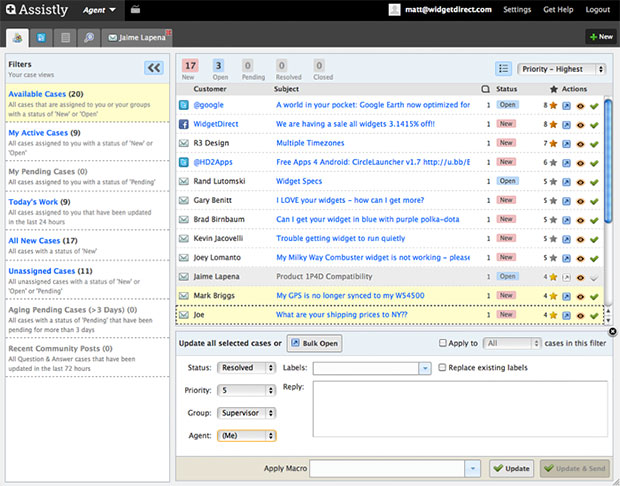
Assistly, a SaaS customer service company, started out with the goal of helping its user base incorporate communications from all channels into the customer service hub. That means messages sent via social media, including tweets and Facebook posts, and even replies to routine transactional emails such as those sent to confirm a sale. In most companies, a response to that type of message lands in a cyberhole.
“Our system is configured to treat email from a customer, no matter where it comes from, as one of the service inputs,” Matthew Trifiro, senior vice president of marketing, told CRM Buyer.
Along with the other inputs, these emails are organized and prioritized for reps to respond, he said.
Version 1.0 of the application was released last October. Now the company has put out version 2.0, with more features that enhance its social customer service functionality, as well as a new pricing plan that lets a company roll out the app to anyone within the firm who can help answer a customer inquiry.
“Basically it allows you to deputize anyone in the firm as a customer service rep if that is what is needed,” Trifiro said.

Optimizing the Agent Workflow
Version 2.0 has added a number of time-saving short cuts, Trifiro said. “We obsess about agent workflow and are always looking to shave minutes from any process.”
The application has made search more efficient, which has had a major impact since it is used throughout the application.
“We see the difference in case filters, search for a customer, search in the knowledge base,” Trifiro said.
The application has also been upgraded to better customize business rules — from how cases are handled to where they are routed.
There is a new feature that lets companies merge customer records more easily. This need was identified as it became clear how often customers would reach out to a company via many different channels.
“They might email from a couple of different addresses, have a landline and cellphone, use Facebook one day and Twitter the next,” noted Trifiro.
With this feature, a company can incorporate all of these addresses and numbers in one record instead of being required to maintain separate records, he explained.
Other changes are more apparent to the end recipient. For example, agents can have custom signatures so their outreach is more personal.
New Price Model
Assistly also introduced price models that are meant to encourage new uses of the application. One is the ability to add flex agents by the hour. This allows companies to ratchet up their service quickly during peak hours, or to bring in certain people for unusual or involved requests.
There are tweaks to the pay model as well, such as a reward system, which is experimental but has been so well received, according to Trifiro, that the company is likely to keep it. Under this model, the system will reward companies for their use of Assistly, giving them free flex hours after so many hours of use.






















































